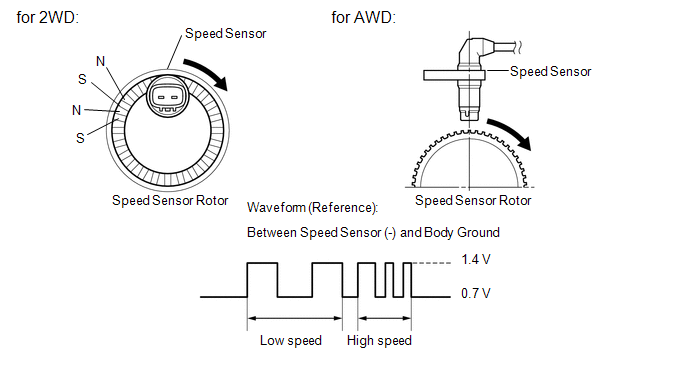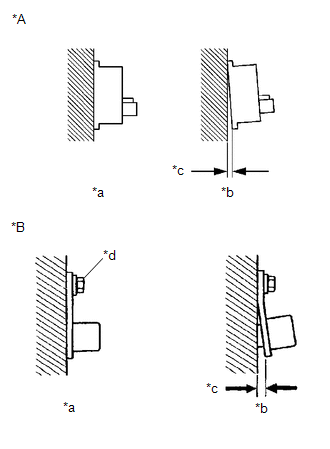- At a vehicle speed 10 km/h (6 mph) or more, output voltage from one of the speed sensors is less than that from the other sensors for 15 seconds or more (for 2WD) or for 30 seconds or more (for AWD).
- At a vehicle speed less than 10 km/h (6 mph), output from one of the speed sensors is 0 km/h (0 mph) for 1 second or more.
- At a vehicle speed less than 10 km/h (6 mph), outputs from both rear speed sensors are 0 km/h (0 mph) for a cumulative time of 200 seconds.
| Last Modified: 08-28-2024 | 6.11:8.1.0 | Doc ID: RM1000000018KEG |
| Model Year Start: 2018 | Model: Sienna | Prod Date Range: [11/2017 - ] |
| Title: BRAKE CONTROL / DYNAMIC CONTROL SYSTEMS: VEHICLE STABILITY CONTROL SYSTEM: C1403,C1404; Rear Speed Sensor RH Malfunction; 2018 - 2020 MY Sienna [11/2017 - ] | ||
|
DTC |
C1403 |
Rear Speed Sensor RH Malfunction |
|
DTC |
C1404 |
Rear Speed Sensor LH Malfunction |
DESCRIPTION
The speed sensor detects wheel speed and sends the appropriate signals to the skid control ECU (brake actuator assembly). These signals are used for ABS control.
-
for 2WD
Speed sensor rotors have rows of alternating N and S magnetic poles and their magnetic fields change when the rotors turn. Each speed sensor detects that magnetic change and sends a pulse signal to the skid control ECU (brake actuator assembly).
-
for AWD
Speed sensor rotors have 48 serrations and their magnetic fields change when the rotors turn. Each speed sensor detects that magnetic change and sends a pulse signal to the skid control ECU (brake actuator assembly).
The hall IC type speed sensor uses the frequency of output pulses to detect the vehicle speed. Because the sensor outputs digital pulses, it can detect vehicle speeds even when the vehicle is nearly stationary.

HINT:
Check the connection status between the sensor connector and the vehicle wire harness.
|
DTC No. |
DTC Detection Condition |
Trouble Area |
|---|---|---|
|
C1403 C1404 |
Any of the following is detected: |
|
HINT:
- DTC C1403 is for the rear speed sensor RH.
- DTC C1404 is for the rear speed sensor LH.
PROCEDURE
|
1. |
CHECK REAR SPEED SENSOR INSTALLATION |
|
(a) Check the speed sensor installation (for 2WD). OK: There is no clearance between the sensor and the rear axle carrier. |
|
(b) Check the speed sensor installation (for AWD).
OK:
There is no clearance between the sensor and the rear axle carrier.
The installation bolt is tightened properly.
Torque
8.0 N*m (82 kgf*cm, 71 in.*lbf)
Text in Illustration
|
*A |
for 2WD |
|
*B |
for AWD |
|
*a |
OK |
|
*b |
NG |
|
*c |
Clearance |
|
*d |
8.0 N*m (82 kgf*cm, 71 in.*lbf) |
Result
|
Result |
Proceed to |
|---|---|
|
OK (for AWD) |
A |
|
OK (for 2WD) |
B |
|
NG (for 2WD) |
C |
|
NG (for AWD) |
D |
| B |

|
| C |

|
| D |

|
|
|
2. |
CHECK REAR SPEED SENSOR TIP |
(a) Remove the rear speed sensor (See page
![2016 - 2020 MY Sienna [12/2015 - ]; BRAKE CONTROL / DYNAMIC CONTROL SYSTEMS: REAR SPEED SENSOR(for AWD): REMOVAL](/t3Portal/stylegraphics/info.gif) ).
).
(b) Check the speed sensor tip.
OK:
No scratches, oil, or foreign matter on the sensor tip.
NOTICE:
Check the speed sensor signal after cleaning or replacement (See page
![2018 - 2020 MY Sienna [11/2017 - ]; BRAKE CONTROL / DYNAMIC CONTROL SYSTEMS: VEHICLE STABILITY CONTROL SYSTEM: TEST MODE PROCEDURE](/t3Portal/stylegraphics/info.gif) ).
).
| NG |

|
CLEAN OR REPLACE REAR SPEED SENSOR |
|
|
3. |
CHECK REAR SPEED SENSOR ROTOR |
(a) Remove the rear speed sensor rotor (See page
![2016 - 2020 MY Sienna [12/2015 - ]; DRIVE SHAFT / PROPELLER SHAFT: REAR DRIVE SHAFT ASSEMBLY: REMOVAL](/t3Portal/stylegraphics/info.gif) ).
).
(b) Check the speed sensor rotor.
OK:
No scratches, oil, or foreign matter on the rotor.
NOTICE:
Check the speed sensor signal after cleaning or replacement (See page
![2018 - 2020 MY Sienna [11/2017 - ]; BRAKE CONTROL / DYNAMIC CONTROL SYSTEMS: VEHICLE STABILITY CONTROL SYSTEM: TEST MODE PROCEDURE](/t3Portal/stylegraphics/info.gif) ).
).
HINT:
If the rear speed sensor rotor needs to be replaced, replace it together with the rear drive outboard joint shaft assembly.
| NG |

|
CLEAN OR REPLACE REAR SPEED SENSOR ROTOR |
|
|
4. |
READ VALUE USING TECHSTREAM (REAR SPEED SENSOR) |
(a) Connect the Techstream to the DLC3.
(b) Start the engine.
(c) Turn the Techstream on.
(d) Enter the following menus: Chassis / ABS/VSC/TRAC / Data List.
(e) Select the Data List using the Techstream (See page
![2018 - 2020 MY Sienna [11/2017 - ]; BRAKE CONTROL / DYNAMIC CONTROL SYSTEMS: VEHICLE STABILITY CONTROL SYSTEM: DATA LIST / ACTIVE TEST](/t3Portal/stylegraphics/info.gif) ).
).
ABS/VSC/TRAC
|
Tester Display |
Measurement Item/Range |
Normal Condition |
Diagnostic Note |
|---|---|---|---|
|
RR Wheel Speed |
Rear wheel speed sensor RH reading / Min.: 0 km/h (0 mph), Max.: 326 km/h (202 mph) |
Vehicle stopped: 0 km/h (0 mph) |
When driving at constant speed: No large fluctuations |
|
RL Wheel Speed |
Rear wheel speed sensor LH reading / Min.: 0 km/h (0 mph), Max.: 326 km/h (202 mph) |
Vehicle stopped: 0 km/h (0 mph) |
When driving at constant speed: No large fluctuations |
(f) Check the speed value output from the speed sensor displayed on the Techstream.
HINT:
Factors that affect the indicated vehicle speed include tire size, tire pressure, and tire wear. The speed indicated on the speedometer has an allowable margin of error. This can be tested using a speedometer tester (calibrated chassis dynamometer). For details about testing and the margin of error, see the reference chart (See page
![2018 - 2020 MY Sienna [11/2017 - ]; METER / GAUGE / DISPLAY: METER / GAUGE SYSTEM: ON-VEHICLE INSPECTION](/t3Portal/stylegraphics/info.gif) ).
).
OK:
The speed value output from the speed sensor displayed on the Techstream is similar to the speed indicated on the speedometer.
Result
|
Result |
Proceed to |
|---|---|
|
NG (for AWD) |
A |
|
NG (for 2WD) |
B |
|
OK |
C |
NOTICE:
Check the speed sensor signal after replacement (See page
![2018 - 2020 MY Sienna [11/2017 - ]; BRAKE CONTROL / DYNAMIC CONTROL SYSTEMS: VEHICLE STABILITY CONTROL SYSTEM: TEST MODE PROCEDURE](/t3Portal/stylegraphics/info.gif) ).
).
HINT:
-
for 2WD:
The rear speed sensor rotor is incorporated into the rear axle hub and bearing assembly.
If the rear speed sensor rotor needs to be replaced, replace the rear axle hub and bearing assembly with rear speed sensor.
-
If troubleshooting has been carried out according to Problem Symptoms Table, refer back to the table and proceed to the next step before replacing parts (See page
![2018 - 2020 MY Sienna [11/2017 - ]; BRAKE CONTROL / DYNAMIC CONTROL SYSTEMS: VEHICLE STABILITY CONTROL SYSTEM: PROBLEM SYMPTOMS TABLE](/t3Portal/stylegraphics/info.gif) ).
).
| B |

|
| C |

|
|
|
5. |
REPLACE REAR SPEED SENSOR |
(a) Turn the ignition switch off.
(b) Replace the rear speed sensor (See page
![2016 - 2020 MY Sienna [12/2015 - ]; BRAKE CONTROL / DYNAMIC CONTROL SYSTEMS: REAR SPEED SENSOR(for AWD): REMOVAL](/t3Portal/stylegraphics/info.gif) ).
).
NOTICE:
Check the speed sensor signal after replacement (See page
![2018 - 2020 MY Sienna [11/2017 - ]; BRAKE CONTROL / DYNAMIC CONTROL SYSTEMS: VEHICLE STABILITY CONTROL SYSTEM: TEST MODE PROCEDURE](/t3Portal/stylegraphics/info.gif) ).
).
|
|
6. |
RECONFIRM DTC |
(a) Clear the DTCs (See page
![2018 - 2020 MY Sienna [11/2017 - ]; BRAKE CONTROL / DYNAMIC CONTROL SYSTEMS: VEHICLE STABILITY CONTROL SYSTEM: DTC CHECK / CLEAR](/t3Portal/stylegraphics/info.gif) ).
).
(b) Start the engine.
(c) Drive the vehicle at a speed of 40 km/h (25 mph) or more for at least 60 seconds.
(d) Check if the same DTC is recorded (See page
![2018 - 2020 MY Sienna [11/2017 - ]; BRAKE CONTROL / DYNAMIC CONTROL SYSTEMS: VEHICLE STABILITY CONTROL SYSTEM: DTC CHECK / CLEAR](/t3Portal/stylegraphics/info.gif) ).
).
Result
|
Result |
Proceed to |
|---|---|
|
DTCs (C1403 and C1404) are not output |
A |
|
DTCs (C1403 and/or C1404) are output |
B |
NOTICE:
Check the speed sensor signal after replacement (See page
![2018 - 2020 MY Sienna [11/2017 - ]; BRAKE CONTROL / DYNAMIC CONTROL SYSTEMS: VEHICLE STABILITY CONTROL SYSTEM: TEST MODE PROCEDURE](/t3Portal/stylegraphics/info.gif) ).
).
HINT:
| A |

|
END |
| B |

|
|
|
|

